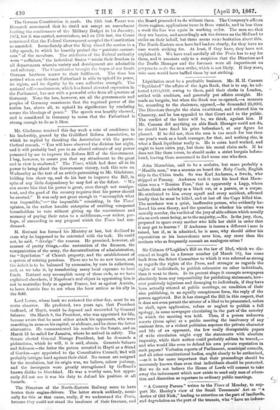Sir Colman O'Loghlen's Bill on the law of libel, which
we dis- cussed at length in a former number (of March 16), has come back from the Select Committee to which it was referred as strong as regards the rights of the Press, and stronger as regards the rights of individuals, to publish calumnies on other individuals, than it went to them. In its present shape it exempts newspapers absolutely from any responsibility for publishing statements, how- ever positively injurious and damaging to individuals, if they have been actually uttered at public meetings, on condition of their also publishing, in an equally conspicuous form, the reply of the person aggrieved. But it has changed the Bill in this respect, that it does not even permit the utterer of a libel to be prosecuted, unless he shall, upon application, refuse or neglect to publish a full apology, in some newspaper circulating in the part of the country in which the meeting was held. Thus, if a person unknown asserts (from spite) at a public meeting the insolvency of any eminent firm, or a violent politician asperses the private character and life of an opponent, the few really disreputable papers of wide circulation might copy the statements with absolute impunity, while their author could probably seldom be traced,— and who would like even to defend his own private reputation in such papers? Verbatim reports of Parliament, municipal councils, and all other constitutional bodies, ought clearly to be authorized, —as it is far more important that their proceedings should be accurately known than even that individuals should be protected. But we do not believe the House of Lords will consent to take away the inducement which now exists to send only men of educa- tion and discretion as reporters to ordinary public meetings.






























 Previous page
Previous page